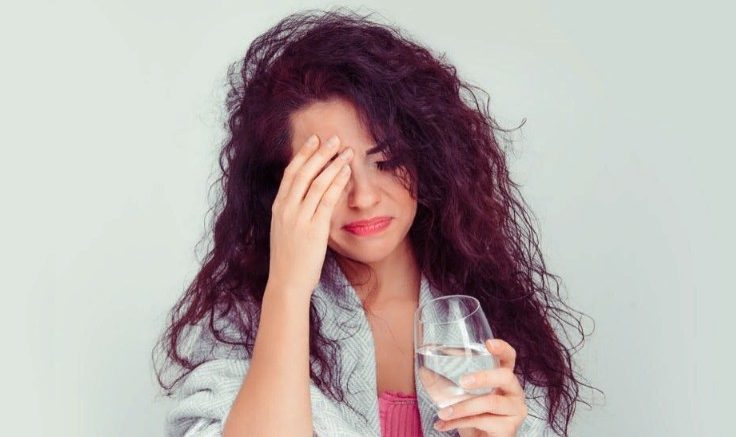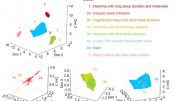If you have a hangover, the morning after a night of drinking is never fun. The majority of people experience headaches, exhaustion, thirst, or nausea as a result of a hangover.
However, some people report feeling anxious with a hangover, which has been nicknamed “hangxiety.” According to some estimates, anxiety during a hangover affects about 12% of people and varies in severity depending on the individual.
A hangover causes physiological stress when the body recovers from a night of drinking. Physiological stress occurs when the body is under duress, such as as a result of a sickness or accident.
A hangover acts in a similar way. Not only does it affect our immune system, but it also raises cortisol levels (commonly known as the “stress hormone”), blood pressure, and heart rate—all of which are changes that occur with anxiety.
The brain undergoes modifications as well. Dopamine (a type of neurotransmitter) activity in the brain is lower during a hangover, according to research. This is significant since dopamine is involved in anxiety regulation. The increased tension experienced during a hangover might make it difficult to cope with any new stress that may arise during the period.
Stress and sleep deprivation, when combined (representing features of a hangover), can cause mood and cognitive function to deteriorate (including attention and memory). It can be difficult to manage everyday responsibilities due to fatigue, tension, and other unpleasant hangover symptoms.
Someone suffering from a hangover, for example, may be too busy with nursing their nausea, headache, or weariness to successfully cope with worrying thoughts.
People suffer a negative shift in their emotions during a hangover, according to our own studies. Many people also said they had more problems controlling their emotions when they were hungover compared to when they weren’t. In other words, people who are suffering from a hangover find it difficult to get back on their feet.
However, when participants were asked to control their emotions in a computer activity, they were able to do so to the same level as when they weren’t hungover—albeit with more effort.
This was accomplished by giving participants visuals that aroused diverse emotions (both positive and negative) but not allowing them to express their feelings outwardly. Some people may experience anxiety as a result of their inability to control their emotions when suffering from a hangover.
Our team looked at how hangovers affect executive functions in another study (mental skills which are important for many aspects of our daily life, including working memory, flexible thinking, and self-control). The participants were given a variety of mental abilities tests, such as remembering a string of letters and recalling them when prompted.
People who were hungover performed worse in crucial parts of executive functions, according to our findings. Executive functions aid in the management of anxiety and the suppression of anxious thoughts. If these brain processes deteriorate during a hangover, it could explain why some people experience anxiety.
Do you get a nervous feeling?
But why do some people suffer from hangxiety and others do not?
Almost every hangover includes pain, whether it’s a headache or muscle aches. However, studies demonstrate that persons who “catastrophize” pain (exaggerate pain or anticipate the worst) are more likely to be anxious. This group is also more prone to have severe hangovers, according to research. This could explain why some people are anxious and others are not.
People who are prone to anxiety, in general, may be more susceptible to hangxiety. Negative life events, despair or rage while drinking, drinking guilt, and even personality factors (such as neuroticism) have all been connected to mood shifts following a hangover. Hangxiety has been associated to symptoms of alcohol use disorder and has been found to be higher in those who claim to be very timid.
These elements, when considered together, explain why hangxiety can affect people differently and why it’s an aspect of hangovers that should be taken seriously. Mood swings caused by a hangover are not only unpleasant, but they may also be linked to problem drinking, increased interpersonal conflict, and decreased productivity at work.
If you suffer from hangxiety, the same approaches that help with anxiety can also help with hangxiety. Meditation, mindfulness practice, and general self-care are examples of this. Planning ahead of time to ensure you have the next day free to recover and avoid other stresses (such as job or family issues) may also help you cope with the added psychological stress.
A hangover can also be used as a bonding experience for some people, allowing them to talk about their previous night of drinking with friends and even struggle with anxiety together.
Of course, the best approach to avoid hangxiety is to avoid drinking at all—or at the very least, to drink in moderation.






buy zithromax online with mastercard https://zithromaxbestprice.icu/ zithromax z-pak
sweet bonanza kazanç https://sweetbonanza.bid/ – slot oyunlari
cipro 500mg best prices https://ciprofloxacin.tech/ cipro pharmacy
ciprofloxacin generic https://ciprofloxacin.tech/ cipro generic